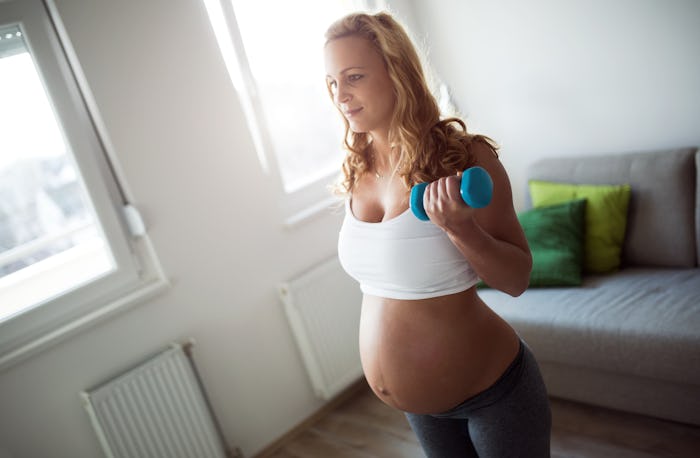Life

Dear Fitspo Moms, Your Post-Birth Transformation Photos Are Unnecessary & Upsetting
It was one thing when celebrities did it, but then came the personal trainers and the chefs and eventually the regular moms. Documenting your weight loss post-baby in the interest of "fitspo," as it's called on Instagram and Pinterest, is a vortex that is sucking more and more women in. The idea behind it is that their "healthy" approach to weight loss is a positive contribution to the mom world, but let me say it: Fitspo moms, your post-birth transformation photos are unnecessary and upsetting.
At least when it's Olivia Wilde, or Blake Lively, or some other statuesque, rich-as-getup celebrity, we can say to ourselves, "She has all kinds of support — chefs, trainers, nannies, night nurses, nutritionists, and so on. That kind of transformation isn't realistic." But when it's regular moms "transforming" from a pregnant person into a much-thinner non-pregnant version of that person, we are taking unrealistic, often unhealthy norms, and twisting them into something more damaging. Simply by placing an "after" photo next to a "before" photo — no matter what the caption says! — you're conveying to the tired mom scrolling her feed, "We all know which of these is better."
I'm not saying that a woman should not be proud to get back in shape, but for many of us, getting our pre-pregnancy bodies "back" is a biological non-starter.
These pictures garner thousands of likes and some of these Fitspo pages have millions of followers. In short, at the time in a woman's life when she is more vulnerable than ever to depression, anxiety, and hemorrhage, we're priming her to feel like she should be stressing about her diet and using her baby as a barbell.
You may think these images are harmless and should serve as inspiration to those who are interested, but studies have shown that this is simply not true. According to an article by The Conversation, "research suggests that exposure to fitness-related images can be detrimental, particularly for women." The article cites a Journal of Health Psychology study that found women reported increased negative mood, depression, and anxiety after only 30 minutes of viewing "fitness magazines promoting the athletic ideal."
And now that we see these images more often than ever — on our phones, in the apps we might turn to for socializing — it can be damaging to a woman especially after having given birth. A quick search on Instagram turns up millions of before-and-after pictures of moms, most taken shortly after birth. I'm all for healthy living, but these images are unrealistic, damaging and unnecessary. What about the recovery? The emotional transformation taking place? Rarely do we see images of women after birth. Most women, myself included, still look pregnant shortly after birth and this can last months. We need to see more realistic images of postpartum bodies. A lot of women experience bloating, swelling, stretch marks, and cellulite. For me, my belly button looked stretched-out and crooked. My stomach was still large and I looked about 5-6 months pregnant. This is very real for most women.
Instead of promoting healthy practices, Fitspo has just became the very thing it set out to destroy, negative body image.
I'm not saying that a woman should not be proud to get back in shape, but for many of us, getting our pre-pregnancy bodies "back" is a biological non-starter. Pregnancy can have a lasting affect on our bodies, and that's totally okay. But when images of perfect postpartum bodies are trending every where we click, it can seem like natural postpartum bodies are actually abnormal; that we need to speed up the process of returning to our pre-pregnancy bodies or face embarrassment and shame.
Seeing these images of thin, toned, and perfect postpartum bodies can really make women feel less confident and it can be frustrating because obtaining this kind of physique is much harder and often more impossible than Fitspo pages make it out to be. Also, although these pages claim to be all about health and fitness, a lot of the bodies in these images are very thin. Most of these images still promote that thin is healthy, they just have muscles now.
The Fitspo movement, though perhaps well intentioned, is just another unrealstic ideal for women to chase. Obtaining a small waistline, like most of these images contain, still promotes an obsession with being thin and can cause self-esteem issues and encourage unhealthy body image amongst women. The Conversation cited research from the same study that shows that the greater the discrepancy between what a woman sees as the ideal and what she feels her own body to be, the more likely she is to "adopt maladaptive eating and exercise patterns."
So, we have just replaced ”thin is in” with ”fit.” The ideal bodies are strikingly similar to bodies we have deemed unhealthy in the past. And thinner bodies are not the only type of healthy. Many women follow healthy diet plans and exercise and yet look nothing like these images, myself included. Having the expectation that women “bounce back” after pregnancy and that our bodies only look different if we don’t work on it, is more harmful than you think.
Instead of promoting healthy practices, Fitspo has just became the very thing it set out to destroy, negative body image. Fitspo models have in a way replaced fashion models and promote their own form of uniformity under the guise of featuring "real" people. There is a dangerous assumption blazing through all of the posts that healthy looks the same for everyone. At least with fashion models, we know they have been retouched and made to look perfect, but in the Fitspo world we are told that these images are natural and obtainable, and that‘s the whole issue — these perfect Fitspo bodies are far from natural.
Check out Romper's new video series, Romper's Doula Diaries:
Watch full episodes of Romper's Doula Diaries on Facebook Watch.